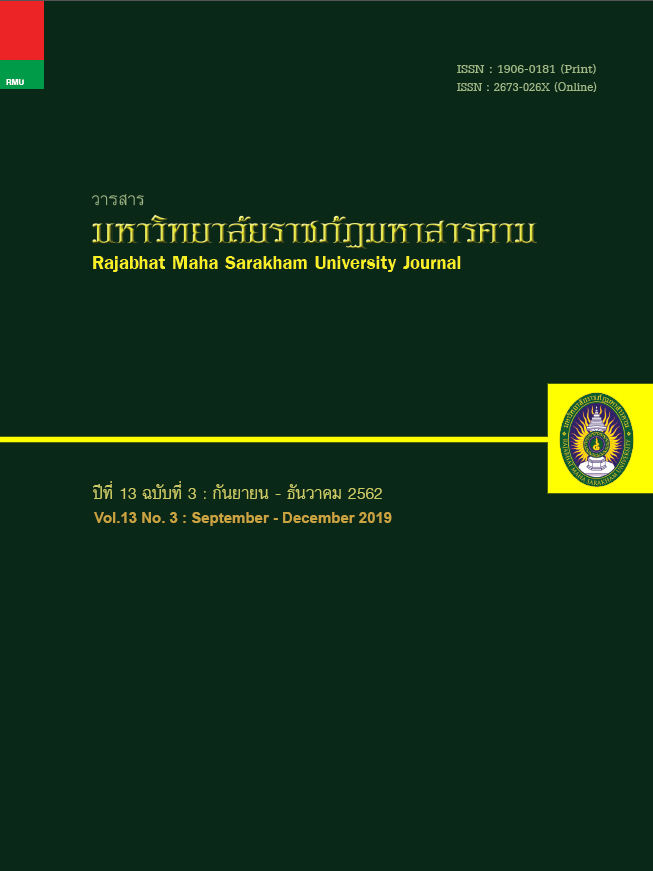การพัฒนาโปรแกรมการออกกำลังกายโดยใช้ศิลปะมวยไทยเพื่อพัฒนาทักษะชีวิต ด้านการจัดการอารมณ์ของนักเรียนชั้นประถมศึกษาตอนปลาย
Main Article Content
บทคัดย่อ
การวิจัยในครั้งนี้มีวัตถุประสงค์เพื่อพัฒนาโปรแกรมการออกกำลังกายโดยใช้ศิลปะมวยไทยที่มีต่อทักษะชีวิตด้านการจัดการอารมณ์ของเด็กนักเรียนชั้นประถมศึกษาตอนปลาย กลุ่มตัวอย่างที่ใช้ได้แก่ เด็กนักเรียนชั้นประถมศึกษาตอนปลายอายุ10–12 ปีจำนวน 64 คน แบ่งเป็น กลุ่มทดลอง 32 คน กลุ่มควบคุม 32 คน การได้มาซึ่งกลุ่มตัวอย่างแบบชั้นภูมิ (Stratified Sampling)ผู้วิจัยได้ดำเนินการโดยการศึกษาวิเคราะห์และสังเคราะห์ทฤษฎี เนื้อหาที่เกี่ยวข้องกับทักษะชีวิตด้านการจัดการอารมณ์ หลักการออกกำลังกาย พัฒนาการด้านร่างกายและศิลปะมวยไทยจากเอกสารและงานวิจัยที่เกี่ยวข้องเพื่อพัฒนาโปรแกรมการออกกำลังกายโดยใช้ศิลปะมวยไทยและหาคุณภาพโดยหาค่าความตรงเชิงเนื้อหาด้วยดัชนีความสอดคล้อง จากผู้ทรงคุณวุฒิทั้ง 5 ท่าน ได้แก่ นักวิทยาศาสตร์การกีฬา นักพลศึกษา ครูปฐมวัยและนักจิตวิทยาผู้วิจัยได้นำโปรแกรมการออกกำลังกายไปใช้กับกลุ่มทดลอง จำนวน 8สัปดาห์ๆ ละ 3 ครั้งๆ 60 นาที โดยมีทดสอบทักษะชีวิตด้านการจัดการอารมณ์ก่อนการทดลองและหลังการทดลอง นำผลที่ได้มาวิเคราะห์หารค่าเฉลี่ย ส่วนเบี่ยงเบนมาตรฐานและทดสอบ (t-test) ผลการวิจัยพบว่า
โปรแกรมการออกกำลังกายที่ผู้วิจัยได้พัฒนาขึ้นมีพื้นฐานมาจากการศึกษาทฤษฏีและงานวิจัยที่เกี่ยวข้องกับทักษะชีวิตด้านการจัดการอารมณ์ หลักการออกกำลังกาย พัฒนาการด้านร่างกายและศิลปะมวยไทยซึ่งประกอบด้วย 5 กิจกรรม คือ กิจกรรมขยับกายใจพร้อม กิจกรรมร่ายรำมวยไทย กิจกรรมอาวุธมวยไทยแบบเดี่ยว กิจกรรมอาวุธมวยไทยแบบคู่และกิจกรรมผ่อนคลายกล้ามเนื้อ จำนวน 24 ท่าออกกำลังกาย มี 4 ขั้นตอน โดยได้รับการตรวจสอบคุณภาพในเนื้อหาด้วยผู้ทรงคุณวุฒิที่เกี่ยวข้องโดยหาค่าดัชนีความสอดคล้องตั้งแต่ 0.5–1.0 พบว่ามีค่าความสอดคล้อง .94 และผลการใช้โปรแกรมการออกกำลังกาย พบว่า กลุ่มทดลองมีทักษะชีวิตด้านการจัดการอารมณ์ที่ดีขึ้นเมื่อเปรียบเทียบระหว่างก่อนการทดลองกับหลังการทดลอง และระหว่างกลุ่มทดลองกับกลุ่มควบคุมอย่างมีนัยสำคัญทางสถิติที่ .05
Article Details
1. บทความที่ลงตีพิมพ์ทุกเรื่องได้รับการตรวจทางวิชาการโดยผู้ประเมินอิสระ ผู้ทรงคุณวุฒิ (Peer Review) สาขาที่เกี่ยวข้อง อย่างน้อย 3 ท่าน ในรูปแบบ Double blind review
2. ข้อคิดเห็นใด ๆ ของบทความที่ลงตีพิมพ์ในวารสารมหาวิทยาลัยราชภัฏมหาสารคาม นี้เป็นของผู้เขียน คณะผู้จัดทำวารสารไม่จำเป็นต้องเห็นด้วย
3. กองบรรณาธิการวารสารมหาวิทยาลัยราชภัฏมหาสารคาม ไม่สงวนสิทธิ์การคัดลอกแต่ให้อ้างอิงแสดงที่มา
เอกสารอ้างอิง
Royal Thai Government Gazette. (1999). National Education Act BE 2542. Amendment (No. 2) BE and (No. 3) BE 2553. Royal Thai Government Gazette, Volume 116.
Office of the National Economic and Social Development Board. (2016). National Economic and Social Development Plan No. 12, BE 2560-2564.
Department of Mental Health. (2000). EQ : Emotional Intelligence. Nonthaburi : Ministry of Public Health.
Thai Public Health Survey Office, Health System Research Institute. (2011). An Evaluation of the National Health Examination Survey in Thailand No.4 BE 2551-2. Received Octorber 25, 2018 from https://www.hiso.or.th/hiso/picture/reportHealth/report/report6_12.pdf.
Ministry of Education, (2008). The basic education core curriculum BE 2511. Bangkok : Thailand Agricultural Cooperation.
Dorkmai Singtis and Shanvet Thammasaowapaak. (2007). The Effect of Keatamouythai Exercising Program to Physical Fitness of Pratomsuksa 5-6 Students, Thonburi District Bangkok. Journal of Education KhonKaen University (Graduate Studies Research), 1(2), 35-46.
Wareeya Widchaya, Patcha Krasaseang, Sajeera Kupittayanant and Nathawut Thanee. (2010). The Effect of Muaythai Dance and Yoga Practicing On Physical Fitness. Journal of Sports Scienceand Technology Volume 11(2), December.
Torsak Kawjaratwilai. (2016). Creation of ancient muaythai exercise model for youth. Journal of Education KhonKaen University, 39(2), 77-86.
Mohammadkhani, S., & Hahtami, M. (2011). The Effectiveness of Life Skills Training on Happiness, Quality of Life and Emotion Regulation. Procedia-Social and Behavioral Sciences, 30, 407-411.
Mikkelsen, K., Stojanovska, L., Polenakovic, M., Bosevski, M., &Apostolopoulos, V. (2017). Exercise and mental health. Maturitas, 106, 48-56.
Edwards, M. K., Rhodes, R. E., Mann, J. R., &Loprinzi, P. D. (2018). Effects of acute aerobic exercise or meditation on emotional regulation. Physiology & behavior, 186, 16-24.
Tsaousis, I., & Nikolaou, I. (2005). Exploring the relationship of emotional intelligence with physical and psychological health functioning. Stress and Health: Journal of the International Society for the Investigation of Stress, 21(2), 77-86.
Stanton, R., &Reaburn, P. (2014). Exercise and the treatment of depression: a review of the exercise program variables. Journal of Science and Medicine in Sport, 17(2), 177-182.
Von Haaren, B., Haertel, S., Stumpp, J., Hey, S., &Ebner-Priemer, U. (2015). Reduced emotional stress reactivity to a real-life academic examination stressor in students participating in a 20-week aerobic exercise training: A randomised controlledtrial using Ambulatory Assessment. Psychology of Sport and Exercise, 20, 67-75.
Azizi, M. (2011). Effects of doing physical exercises on stress-coping strategies and the Intensity of the stress experienced by university students in Zabol, Southeastern Iran. Procedia-Social and Behavioral Sciences, 30, 372-375.
Kim, J. H., & McKenzie, L. A. (2014). The impacts of physical exercise on stress coping and well-being in university students in the context of leisure. Health, 6(19), 2570-2580.
Telles, S., Singh, N., Bhardwaj, A. K., Kumar, A., &Balkrishna, A. (2013). Effect of yoga or physical exercise on physical, cognitive and emotional measures in children: a randomized controlled trial. Child and Adolescent Psychiatry and Mental Health, 7(1), 37.


